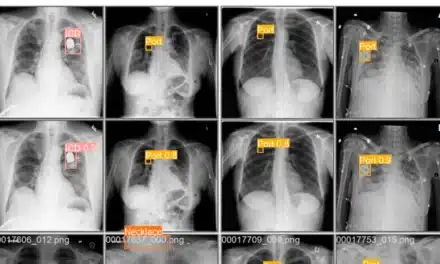Hologic Inc, Marlborough, Mass, has signed an agreement with the University of Minnesota to be the exclusive provider of Dexalytics: TEAMS in North America. The partnership provides the sports science and human performance industry with the ability to harness body composition data obtained from dual X-ray absorptiometry (DXA) scans, compare it to sport- and position-specific standards, and provide actionable information that can help collegiate and professional trainers, coaches, and medical staff train better athletes.
Hologic’s Horizon DXA system provides Advanced Body Composition Reports that not only show the exact location of bone, lean, and fat masses, but also provide visual comparison of changes in these three compartments over time. Dexalytics’ cloud-based software leverages this best-in-class body composition data and more than 30 years of DXA research to provide critical measurements that extend beyond the traditional metrics of body fat percentage, total lean mass, and total fat mass used in the past. The software reinvents the way the data is reported, using a proprietary system to look at the measurements in new ways. This transforms pages of clinical data into a manageable athlete score that can be directly connected to sport performance. These scores provide trainers and team leadership with recommended sport- and position-specific body composition ranges for athletes, which can then be applied to an individual or group of athletes to track progress over time.
“We’re very excited to be working alongside an institution with a laser-sharp focus on forward-thinking innovation that mirrors our own,” says Pete Valenti, division president of breast and skeletal health solutions at Hologic. “This partnership presents an opportunity for our best-in-class technology to be used in impactful ways with new audiences, and helps differentiate elite athletic programs on the collegiate and professional levels by providing them with this cutting-edge tool to set their organizations and players apart from the pack.”
The ability to compare athletes’ body composition against predetermined standards provides critical insight into how to best train and coach them. These tailored player profiles allow experts to identify accurate baseline body types for return-to-play following injuries, understand how athletes’ bodies change over the course of a season, and evaluate the effectiveness of nutrition and training strategies.
“We’re thrilled to be working with Hologic to ensure this brand-new software we’ve worked so hard to develop will reach as many athletes as possible,” says Donald Dengel, PhD, director of the Laboratory of Integrative Human Physiology. Dengel’s research lab is part of the Consortium for College Athlete Research, a consortium of five universities from Power Five Conferences that pool their DXA data to provide and publish position- and event-specific normative DXA values for a variety of collegiate sports.
“A lot of time and resources are spent understanding what an athlete’s body can do, without a good understanding of what an athlete’s body is made of,” says Tyler Bosch, PhD, co-founder and head of research and development for Dexalytics. “This partnership provides a solution to that problem by providing accurate and reliable body composition measurements, with sport- and position-specific body type analyses. We visualize an athlete’s body to identify their individual, optimal body type.”
The Dexalytics software, developed by Educational Technology Innovations in the College of Education and Human Development at the University of Minnesota, is the culmination of more than 30 years of body composition research, including extensive work on professional and collegiate athletes.
Financial terms of the agreement were not disclosed.





